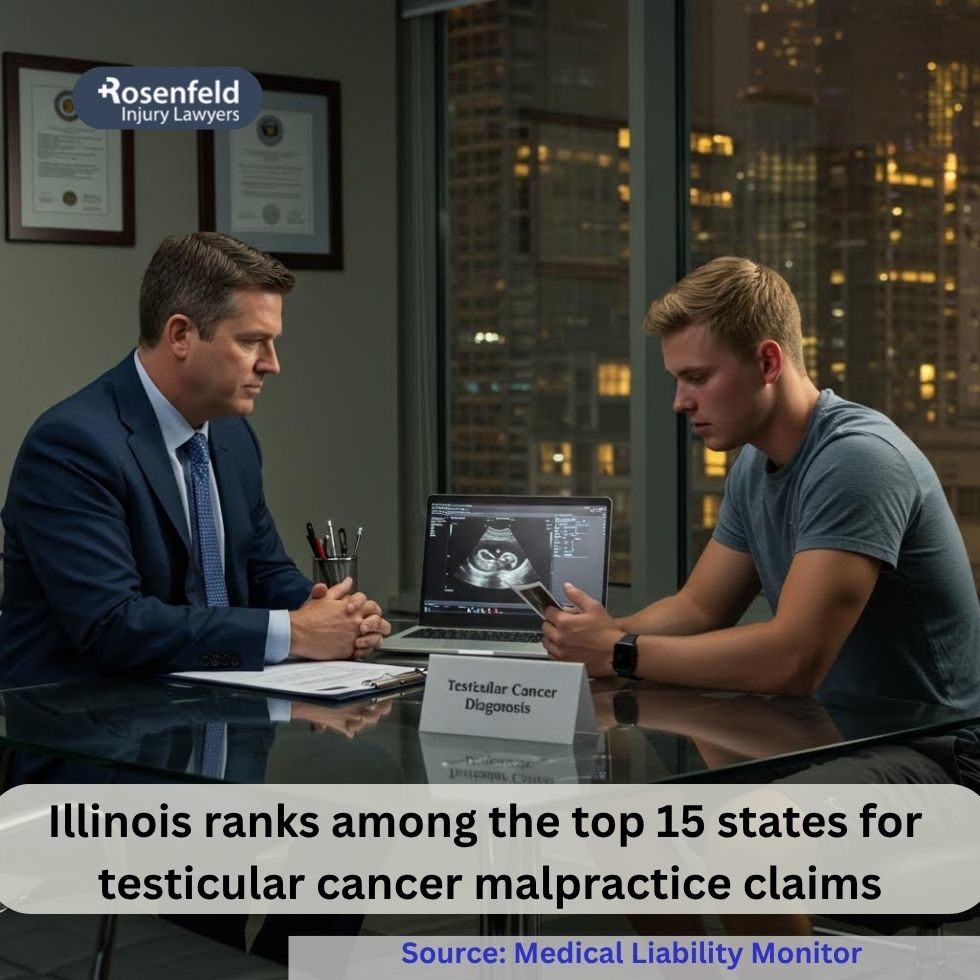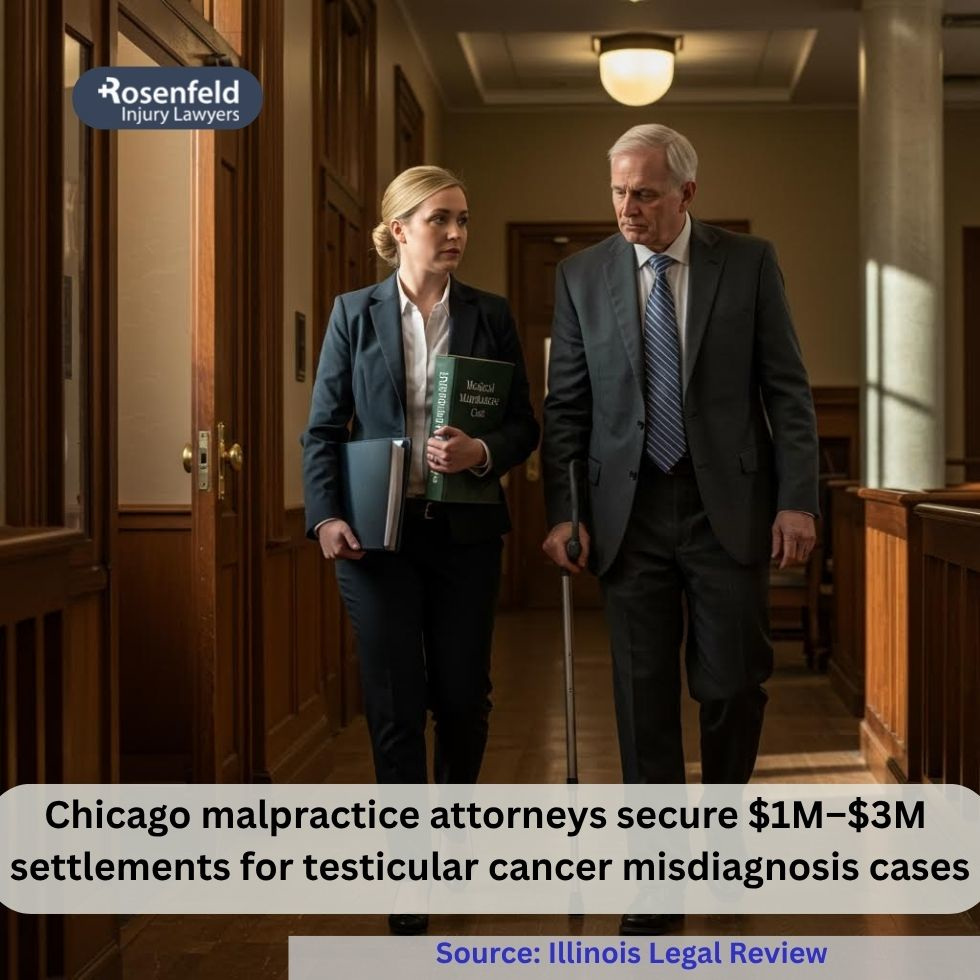- 24/7 Free Consultation: (888) 424-5757 Tap Here To Call Us
Chicago Testicular Cancer Misdiagnosis Lawyer

At Rosenfeld Injury Lawyers, an experienced Chicago testicular cancer misdiagnosis lawyer fights for individuals and families affected by an incorrect diagnosis. Such cases can have devastating consequences, delaying treatment and allowing the cancer to spread.
What is Testicular Cancer?
Testicular cancer occurs when abnormal cells grow in the affected testicle, often starting in the germ cells that produce sperm. It is one of the most commonly misdiagnosed conditions, primarily affecting younger men between the ages of 15 and 40. With an early diagnosis and proper treatment, survival rates are high, making timely detection essential.
Types of Testicular Cancer (Seminoma vs. Non-Seminoma)
Testicular cancer is classified into two main types:
- Seminoma – A slower-growing cancer that typically affects men in their 30s and 40s. It responds well to radiation therapy and has a high rate of survival when detected early.
- Non-seminoma – A more aggressive form that often develops in younger men and spreads quickly to other organs. It requires intensive treatment, including surgery and chemotherapy.

Risk Factors for Developing Testicular Cancer
Several factors can increase the risk of developing testicular cancer, including:
- Undescended testicle (cryptorchidism) – Men born with a testicle that did not move into the scrotum naturally have a higher risk.
- Family history – Having a close relative with testicular cancer raises the risk.
- Previous testicular cancer – Men who have had cancer in one testicle are at an increased risk of developing it again.
- Age and race – It is most common in younger men (15-40) and occurs more frequently in Caucasian men.
Signs and Symptoms of Testicular Cancer
Common symptoms of testicular cancer include:
- Scrotum pain or discomfort in the testicle;
- Swelling or a lump in one testicle;
- A feeling of heaviness in the scrotum;
- Fluid-buildup cyst;
- Pelvic pain or lower abdominal discomfort;
- Enlarged lymph nodes in advanced stages.
Regular self-exams help with early detection, but if a physician misdiagnoses or dismisses symptoms, this can lead to a late diagnosis requiring more aggressive treatment.
Stages of Testicular Cancer
Testicular cancer is staged based on how far it has spread:
- Stage I – Cancer is limited to the testicle. Treatment is most effective at this stage.
- Stage II – Cancer has spread to the lymph nodes in the abdomen. More intensive treatment may be required.
- Stage III – The cancer has spread to distant organs, such as the lungs or liver, making treatment more challenging.
The Standard of Care for Diagnosing Testicular Cancer
Doctors have a responsibility to follow accepted medical standards when diagnosing testicular cancer. A doctor’s failure to recognize symptoms, perform necessary tests, or adequately interpret medical records can lead to a misdiagnosis, delaying life-saving treatment. Proper medical care includes:
- Physical examination – A doctor should check for lumps, swelling, or other abnormalities in the testicle and scrotum.
- Ultrasound imaging – This imaging test helps distinguish between a fluid-filled cyst and a malignant tumor.
- Blood tests for tumor markers – Elevated levels of specific proteins, such as AFP and HCG, can indicate testicular cancer.
- CT scans or MRIs – These tests help determine if the cancer has spread to other organs.
- Timely specialist referral – If cancer is suspected, the patient should be referred to a urologist or oncologist for further evaluation.
When healthcare providers fail to follow these steps, it may constitute medical malpractice, which can lead to a medical misdiagnosis lawsuit.
Common Causes of Testicular Cancer Misdiagnosis
A testicular cancer misdiagnosis can occur when medical professionals fail to follow proper diagnostic procedures. Errors such as overlooking early symptoms, misinterpreting test results, or delaying specialist referrals can lead to a delayed or incorrect diagnosis, increasing the risk of cancer spread and requiring more aggressive treatment.
Failure to Perform a Thorough Examination
A physical exam is the first step in diagnosing testicular cancer. If a doctor fails to examine the testicle properly, they may overlook lumps, swelling, or other abnormalities. Skipping this essential step can lead to faliure to provide a correct diagnosis, allowing the cancer to progress unchecked.
Misinterpretation of Symptoms or Dismissing Patient Concerns
Symptoms such as scrotum pain, swelling, or a lump should never be ignored. A physician misdiagnoses or dismisses a patient’s concerns without ordering further tests, which can result in a delayed diagnosis. Medical misdiagnosis occurs when a doctor assumes symptoms are minor without conducting the proper evaluations.

Delay in Ordering or Improper Performance of Scrotal Ultrasound
A scrotal ultrasound is a critical imaging test to detect abnormalities in the testicle. A physician’s failure to order this test promptly, or errors in performing or interpreting the ultrasound, can lead to a wrong diagnosis, delaying necessary treatment and increasing the risk of cancer spread.
Misinterpretation of Tumor Marker Results
Bloodwork that measures tumor markers, like AFP and HCG, can help diagnose cancer. If a doctor fails to recognize abnormal test results or dismisses elevated levels as insignificant, it may result in a missed diagnosis and delayed treatment, putting the patient’s survival at risk.
Misdiagnosis as Another Condition (e.g., Epididymitis, Hydrocele)
Because testicular cancer can present with swelling or discomfort, it is sometimes mistaken for epididymitis (infection) or a hydrocele (fluid-buildup cyst). A wrong diagnosis can lead to wrong treatment with antibiotics or pain relievers instead of cancer treatment, delaying the correct care.
Failure to Refer to a Urologist or Oncologist in a Timely Manner
When medical professionals suspect testicular cancer, they should promptly refer the patient to a urologist or oncologist for further evaluation. A doctor’s failure to make this referral on time can delay necessary testing and treatment, allowing the disease to advance to later stages.
The Consequences of Testicular Cancer Misdiagnosis
An incorrect or delayed diagnosis of testicular cancer can drastically affect a patient’s health and treatment options. When a doctor fails to recognize symptoms or order the appropriate tests, the cancer may spread to other organs, making treatment more difficult.
Early-stage testicular cancer is highly treatable, often requiring minimal intervention. However, a missed diagnosis may force patients to undergo more aggressive treatment, such as chemotherapy, radiation, or extensive surgery, increasing medical expenses and recovery time.
In some cases, delayed detection can lead to permanent complications, infertility, or even fatality. A physician’s misdiagnosis can significantly lower survival rates, highlighting the importance of timely diagnosis and proper medical care.
Legal Options for Victims of Testicular Cancer Misdiagnosis in Chicago
A testicular cancer misdiagnosis can have devastating consequences, leading to delayed treatment, increased suffering, and higher medical bills. If a physician’s failure to provide a timely diagnosis caused harm, you may have grounds for a medical malpractice lawsuit.
Victims of medical negligence have the right to seek compensation and hold healthcare providers accountable for their mistakes. An experienced Chicago medical misdiagnosis lawyer can help you understand your legal options and fight for the justice you deserve.
Establishing Medical Negligence in Misdiagnosis Cases
To prove medical malpractice, a patient must demonstrate that a healthcare provider failed to meet the accepted standard of care. This requires proving:
- Duty of care – A doctor-patient relationship existed, meaning the doctor was responsible for providing competent medical care.
- Breach of duty – The doctor’s misdiagnosis or failure to diagnose fell below the standard expected of a reasonable medical professional.
- Causation – The delayed diagnosis or wrong diagnosis directly leads to harm, such as cancer progression or the need for more aggressive treatment.
- Damages – The patient suffered financial, physical, or emotional harm, such as high medical bills, lost income, or decreased quality of life.
Investigating Your Case
Building a strong medical malpractice case requires thorough investigation. A testicular cancer misdiagnosis attorney will:
- Obtain medical records to analyze diagnostic errors and wrong diagnoses.
- Consult medical experts, such as oncologists and pathologists, to determine if negligence occurred.
- Review test results, including blood tests, imaging tests, and pathology reports, to identify errors in diagnosing testicular cancer.
- Collect evidence to prove the doctor failed to order appropriate tests or refer the patient to a specialist.
Seeking Compensation
Victims of medical malpractice can seek compensation for:
- Medical bills – Covers hospital visits, radiation therapy, surgeries, and future care.
- Lost wages – Reimbursement for time missed from work due to serious illness or treatment.
- Pain and suffering – Compensation for physical pain, emotional distress, and diminished quality of life.
- Wrongful death damages – If a misdiagnosis leads to a patient’s death, surviving family members may seek compensation for funeral costs, loss of companionship, and financial support.

Holding Negligent Healthcare Providers Accountable
Filing a medical misdiagnosis claim is not just about seeking compensation—it’s also about preventing similar mistakes from happening to others. Holding healthcare providers accountable helps improve patient safety, encourages better diagnostic practices, and ensures doctors take cancer symptoms seriously. If you or a loved one suffered due to a testicular cancer misdiagnosis, an experienced medical malpractice lawyer in Chicago can help you fight for justice.
Contact a Medical Malpractice Lawsuit Attorney for a Free Consultation

If you or a loved one has suffered due to a testicular cancer misdiagnosis, the legal team at Rosenfeld Injury Lawyers is here to help. Our experienced Chicago medical misdiagnosis attorneys are committed to holding negligent healthcare providers accountable and fighting for the compensation you deserve.Our Chicago personal injury attorneys work on a contingency fee basis, meaning you pay nothing unless we successfully recover your compensation. Call us at (888) 424–5757 or complete our contact form to schedule a free case evaluation.
All content undergoes thorough legal review by experienced attorneys, including Jonathan Rosenfeld. With 25 years of experience in personal injury law and over 100 years of combined legal expertise within our team, we ensure that every article is legally accurate, compliant, and reflects current legal standards.







